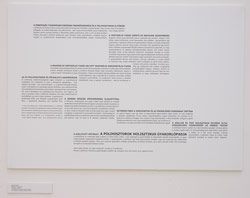Lendvai Ádám
An increase in the volume of human knowledge and the disappearance of polyhistors
Since the golden age of polyhistors, or polymaths, human knowledge has quantitatively grown to such a degree that it has become impossible for one person to hold. As a result, polyhistors, in the original sense of the word ? those who were highly knowledgeable about all things ? have disappeared once and for all. According to some, however, there exist polymaths of a new kind today, who are certain to surface in the not too distant future. Therefore, it is worth pondering the exhibited object, which can be interpreted based on fragments of information on an academy of new polyhistors.
The demand for vertical knowledge and the specialists of today
People today learn from childhood to specialise in one field; the more they immerse themselves in it, the more successful they become in life. By specialising in one area, they work as extremely refined cogwheels executing with maximum efficiency a single manufacturing phase of some "product" (object, knowledge, information, etc.). These perfect cogwheels constitute the machinery of our functional society. Specialisation ? becoming effective instruments of production ? is not a human interest, but a social one. In realising this objective, people are manipulated on multiple levels into unconscious consumers, so that, in an effort to satisfy their programmed desires, through the transposition of their salary and credit, they "voluntarily" force themselves into the role of a well-paid target instrument. In any small area of specialisation, in any profession, the value of human beings is determined by the extent to which they have penetrated the given area, to which they have become "pros" in something. This way, people watch a chosen segment of the world from the perspective of the cogwheel, observing it very close up and clearly through the eyes of "a professional", but they do not have the distance necessary for seeing through to the whole.
Maximal horizontal knowledge instead of maximal vertical knowledge
In the face of social and economic expectations, polyhistors act differently. As opposed to vertical immersion in individual, narrow segments of the knowable, they seek all-encompassing, comprehensive knowledge, by giving up in-depth engagement with details. While specialists and scientists concentrate on maximal vertical depth, polymaths aim for perceiving horizontal wholeness, even if through permeability between distant domains. Thus the new polyhistor gives up the sharp discernment of details in order to be able to perceive the whole ? even if a bit vaguely.
The new polyhistors and their underground academy
The new polyhistors do not immerse themselves in the various domains of human knowledge and, thus, cannot be utilised as effective producers in the machinery of society*. "Infinitely expanded superficial knowledge" is of no value to society and the economy, therefore their existence is not necessarily desirable, or, to be more exact: is necessarily undesirable. They cannot know that which society and the economy do not finance, or accept. As the Polyhistor Academy cannot be supervised and controlled, it cannot be a public entity. Consequently, the academy of polyhistors can only come into being as an underground movement; its existence cannot be uncovered.
Learning to move freely
The Polyhistor Academy must arm its members with the resistant behavioural scheme of the outsider, which helps them move freely in opposition to social interests. The new polymaths do not want to make purchases or make money. Furthermore, the kind of all-inclusive knowledge and curiosity, which helps free movement in the realms of the known and unknown, is essential for them. The new polyhistors must handle curiosity and interest with more awareness than everyone else, so that they will not be pulled into the depths of any one area of speciality.
Balancing on the horizon and keeping interest at bay
Watching the whole is only possible if we are able to keep our concentration balanced and we do not surrender to the temptation of details. For the conscious realisation of this aim, unyielding self-control is required. New polyhistors limit themselves so that they do not sink into the details of the world. Just as the celibacy of priests imposes restraint on sexual desire, so do new polyhistors curb their desire for satisfying their interest in individual fields.
The map of knowledge as outlined on the human body by the holistic unity of mind and body
The polyhistor is familiar with the holistic unity of the mind and body. Acupuncture and other Eastern and natural healing methods have shown that a close unity exists between mind and body, as a result of which polymaths are able to delineate the various areas of knowledge on the surface of the human body.
The exhibited artefact: the polyhistor?s practice bench
Polyhistors project knowledge in its entirety onto the human body. They can exercise and develop their capability of resistance against the nails, which embody various areas of specialisation. Polymaths keep themselves balanced on the bench by not allowing any one individual area of specialisation closer than the others. As they do not strive for unequal vertical immersion in any field, they sense available knowledge in its entirety as a continuous, homogeneous, horizontal surface.
"I don?t know anything,
but I know about everything" / a polyhistor
In case of the polyhistor?s practice bench, this would sound as follows: "I am injured by nothing, but I feel the whole thing".
* Strangely, at present, the "profession", which does not necessarily become vertically absorbed in the details of a given segment of our world (and, thus, is not useful in the strict sense of the word), but rather connects distant areas through horizontal cross-references of a divided knowledge. It is this interdisciplinary approach, which ? albeit to an extreme extent - characterises new polyhistors as well.


